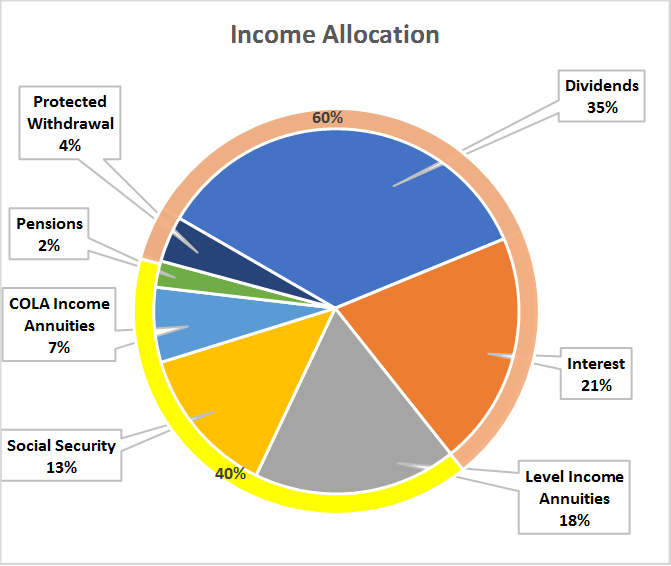Stock Fear? A Solid Income Plan Helps Keep Retirees Safe
If your retirement income relies on the stock market, a plunge isn't just "paper losses" to you. Here's the income plan my wife and I use that takes the worry out of market volatility.


Profit and prosper with the best of Kiplinger's advice on investing, taxes, retirement, personal finance and much more. Delivered daily. Enter your email in the box and click Sign Me Up.
You are now subscribed
Your newsletter sign-up was successful
Want to add more newsletters?

Delivered daily
Kiplinger Today
Profit and prosper with the best of Kiplinger's advice on investing, taxes, retirement, personal finance and much more delivered daily. Smart money moves start here.

Sent five days a week
Kiplinger A Step Ahead
Get practical help to make better financial decisions in your everyday life, from spending to savings on top deals.

Delivered daily
Kiplinger Closing Bell
Get today's biggest financial and investing headlines delivered to your inbox every day the U.S. stock market is open.

Sent twice a week
Kiplinger Adviser Intel
Financial pros across the country share best practices and fresh tactics to preserve and grow your wealth.

Delivered weekly
Kiplinger Tax Tips
Trim your federal and state tax bills with practical tax-planning and tax-cutting strategies.

Sent twice a week
Kiplinger Retirement Tips
Your twice-a-week guide to planning and enjoying a financially secure and richly rewarding retirement

Sent bimonthly.
Kiplinger Adviser Angle
Insights for advisers, wealth managers and other financial professionals.

Sent twice a week
Kiplinger Investing Weekly
Your twice-a-week roundup of promising stocks, funds, companies and industries you should consider, ones you should avoid, and why.

Sent weekly for six weeks
Kiplinger Invest for Retirement
Your step-by-step six-part series on how to invest for retirement, from devising a successful strategy to exactly which investments to choose.
The stock market recently gave us a reminder of what volatility feels like.
I’m writing this on the day following a two-day, 8% plummet in the Dow Jones industrial average. Everyone I talk to asked, “What happened?” “What do I do?” “Will it get worse?”
The most frantic questioners were those who had the largest amount of their savings in stocks, especially the ones who depend on equities to provide them with their retirement cash flow. (Even the Millennials got spooked when their robo-advisers jammed up.)
From just $107.88 $24.99 for Kiplinger Personal Finance
Become a smarter, better informed investor. Subscribe from just $107.88 $24.99, plus get up to 4 Special Issues

Sign up for Kiplinger’s Free Newsletters
Profit and prosper with the best of expert advice on investing, taxes, retirement, personal finance and more - straight to your e-mail.
Profit and prosper with the best of expert advice - straight to your e-mail.
The pundits immediately suggested that investors should “stay the course.” Some also opined, “This market correction probably was a good thing.”
But think about the investor whose cash flow depends on the value of the market, someone who takes required minimum distributions from her 401(k) or rollover IRA. She just experienced serious “Income Volatility” — a reduction in income from a fall in the market. It was the last thing she needed.
Income allocation over asset allocation
I believe we can create income allocation strategies that don’t collapse with our confidence when the market goes haywire — and that can reduce income volatility to near zero.
Here is a rough illustration of my own situation, which allowed my wife and me to stay calm during the drop. I concentrate on income allocation and the minimization of income volatility, not asset allocation and market volatility. And the plan is to provide income for the rest of our lives, however long it might be.
The pie chart below shows where my income comes from. Note that a high percentage of this income is likely to grow, addressing most of my concerns about inflation. If you add in my life insurance, long-term care insurance and longevity insurance in the form of a deferred income annuity called a QLAC, my plan is protected from life risks. Not everyone can get to a plan like this but it’s worth striving for.

How did I get to this position?
As an investment adviser, I understand the power of high-dividend stock portfolios and ways to manage income volatility.
As a retirement income planner, I understand the difference between income and withdrawals. (When your plan is set up correctly, it means that today’s cash flow doesn’t impact future income.)
As an actuary, I appreciate and understand the unique benefits that life insurance, long-term care insurance and income annuities can provide.
And as a fellow Baby Boomer and consumer of financial products, I understand the peace of mind I get from regular “paychecks” – along with the pleasure of seeing as little as possible go out in taxes.
While my background gives me a particular advantage, there’s one thing that all investors and their advisers can do for us Boomers: Think of the plans you’re building for retirement as being not about “asset allocation,” but about “income allocation.” The goal is to minimize income volatility.
Profit and prosper with the best of Kiplinger's advice on investing, taxes, retirement, personal finance and much more. Delivered daily. Enter your email in the box and click Sign Me Up.

Jerry Golden is the founder and CEO of Golden Retirement Advisors Inc. He specializes in helping consumers create retirement plans that provide income that cannot be outlived. Find out more at Go2income.com, where consumers can explore all types of income annuity options, anonymously and at no cost.
-
 The Tool You Need to Avoid a Post-Divorce Administrative Nightmare
The Tool You Need to Avoid a Post-Divorce Administrative NightmareLearn why a divorce decree isn’t enough to protect your retirement assets. You need a QDRO to divide the accounts to avoid paying penalties or income tax.
-
 When Estate Plans Don't Include Tax Plans, All Bets Are Off
When Estate Plans Don't Include Tax Plans, All Bets Are OffEstate plans aren't as effective as they can be if tax plans are considered separately. Here's what you stand to gain when the two strategies are aligned.
-
 Relying on Real Estate in Retirement? Avoid These 3 Mistakes
Relying on Real Estate in Retirement? Avoid These 3 MistakesThe keys to successful real estate planning for retirees: Stop thinking of property income as a reliable paycheck, start planning for tax consequences and structure your assets early to maintain flexibility.
-
 When Estate Plans Don't Include Tax Plans, All Bets Are Off: 2 Financial Advisers Explain Why
When Estate Plans Don't Include Tax Plans, All Bets Are Off: 2 Financial Advisers Explain WhyEstate plans aren't as effective as they can be if tax plans are considered separately. Here's what you stand to gain when the two strategies are aligned.
-
 Counting on Real Estate to Fund Your Retirement? Avoid These 3 Costly Mistakes
Counting on Real Estate to Fund Your Retirement? Avoid These 3 Costly MistakesThe keys to successful real estate planning for retirees: Stop thinking of property income as a reliable paycheck, start planning for tax consequences and structure your assets early to maintain flexibility.
-
 I'm a Financial Planner: These Small Money Habits Stick (and Now Is the Perfect Time to Adopt Them)
I'm a Financial Planner: These Small Money Habits Stick (and Now Is the Perfect Time to Adopt Them)February gets a bad rap for being the month when resolutions fade — in fact, it's the perfect time to reset and focus on small changes that actually pay off.
-
 Nasdaq Leads a Rocky Risk-On Rally: Stock Market Today
Nasdaq Leads a Rocky Risk-On Rally: Stock Market TodayAnother worrying bout of late-session weakness couldn't take down the main equity indexes on Wednesday.
-
 Social Security Break-Even Math Is Helpful, But Don't Let It Dictate When You'll File
Social Security Break-Even Math Is Helpful, But Don't Let It Dictate When You'll FileYour Social Security break-even age tells you how long you'd need to live for delaying to pay off, but shouldn't be the sole basis for deciding when to claim.
-
 I'm an Opportunity Zone Pro: This Is How to Deliver Roth-Like Tax-Free Growth (Without Contribution Limits)
I'm an Opportunity Zone Pro: This Is How to Deliver Roth-Like Tax-Free Growth (Without Contribution Limits)Investors who combine Roth IRAs, the gold standard of tax-free savings, with qualified opportunity funds could enjoy decades of tax-free growth.
-
 One of the Most Powerful Wealth-Building Moves a Woman Can Make: A Midcareer Pivot
One of the Most Powerful Wealth-Building Moves a Woman Can Make: A Midcareer PivotIf it feels like you can't sustain what you're doing for the next 20 years, it's time for an honest look at what's draining you and what energizes you.
-
 Stocks Make More Big Up and Down Moves: Stock Market Today
Stocks Make More Big Up and Down Moves: Stock Market TodayThe impact of revolutionary technology has replaced world-changing trade policy as the major variable for markets, with mixed results for sectors and stocks.